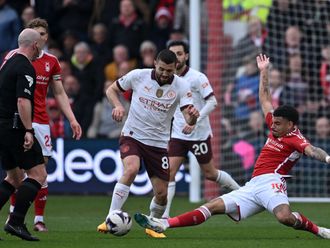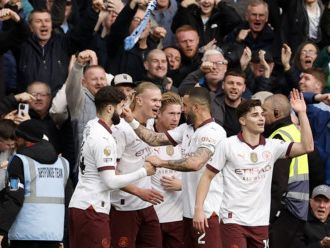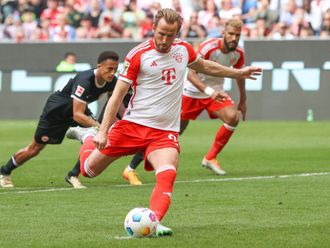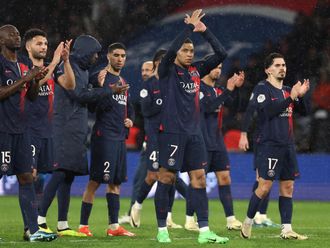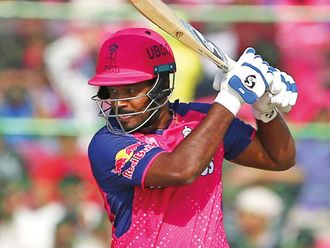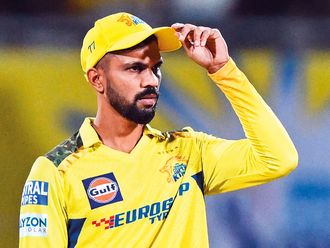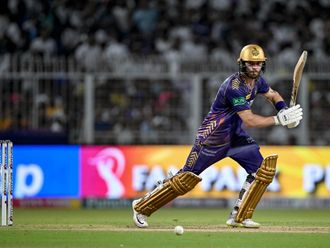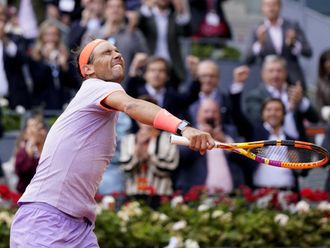Manchester: There may be as much a feeling of relief as a sense of anticipation and excitement at Manchester City should Gabriel Jesus make his long-awaited debut for the club against Everton at Goodison Park on Sunday.
For months in the lead up to City finally securing a pounds 27 million (Dh121.5 million) deal with Palmeiras to sign the Brazilian wonderkid last August, Jesus had compatriot and idol Neymar in his ear badgering him to join Barcelona, not to mention Real Madrid, Bayern Munich and Paris St-Germain all trying to muscle in on the action.
By the end, it took the personal intervention of Pep Guardiola to finally swing things City’s way, the manager’s persuasive charm offensive and selling of a vision ultimately outstripping the lure of Neymar’s million-dollar smile, playing with Lionel Messi and the Spanish lifestyle to ensure a process that had begun two years earlier did not end in disappointment.
City watched Jesus in the flesh almost 50 times before signing the 19-year-old, committing hundreds of man hours to forensically chart the forward’s meteoric rise to prominence in Brazil in one of the most exhaustive recruitment drives since Shaikh Mansour Bin Zayed Al Nahyan, Deputy Prime Minister and Minister of Presidential Affairs, transformed City’s fortunes nine years ago.
So what are City getting for their efforts and expensive outlay and have they finally found both a long-term replacement for Sergio Aguero and a player who, in the shorter term, can help to ease the burden on the Argentina striker, whose relationship with Guardiola has been the source of much curiosity?
When Ronaldo, the former Brazil, Barcelona and Real striker who won two World Cups, said “I look at Gabriel and see myself in the past”, he did not mean as a player per se but in the sense of “him being so young but already having achieved so much and having so much responsibility”.
Whereas Ronaldo was a one-man wrecking ball of a centre-forward, Brazil’s new No. 9 is smaller, slighter, a versatile forward who can play wide, in the hole or up top.
“He makes good movements, runs in behind,” Guardiola said.
“You have to use him close to Sergio, close to our strikers.”
For all the success of Fernandinho at City, the club have not always had an easy time with Brazilians.
Jo and Glauber Berti became figures of fun while Robinho and Elano briefly captured the imagination but, more often than not, flattered to deceive and were more trouble than they were worth.
Robinho attracted headlines for once doing a bunk from a City training camp in Tenerife but that was not much of a surprise given that the manager at the time, Mark Hughes, even had trouble persuading the Brazilian to wear a club suit on European trips.
Language barriers were often blamed although City staff noted that Robinho seldom struggled to understand when told he had a day off.
Respect and discipline should not be an issue where Jesus is concerned and, if it is, he will have his beloved mum close by to keep him in check.
Vera Lucia Diniz de Jesus raised her four siblings on her own and she has been instrumental in instilling the discipline and values that City insiders say have been apparent in the 10 days since he arrived at the club on a permanent basis.
“My son lowers his head when I speak,” she once said.
Vera would rarely watch Jesus play football growing up because of the demands of her cleaning job, Football never came at the expense of education, though.
“I always told my children that being black and poor, you have to study hard,” she said.
Only last week, Jesus offered a snapshot of his close relationship with his mum when he posted a message on Instagram that read: “I’m going to be one of the favelados [person who lives in a favela] that will conquer the world, I’ll be my mother’s cause for so much pride.” Deeply religious, Jesus will wear No. 33 at City, a nod to the commonly held belief among Christians that Jesus Christ was 33 when he was crucified.
Watching Jesus play now, it is hard to believe this favelado, who grew up in the Jardem Peri slum of Sao Paulo, actually started out as a centre-half.
“With me, he was a defender,” said Nilson Coelho Santos, Jesus’s coach at Pequeninos do Meio Ambiente, his first junior side in Sao Paulo.
“He was small, but tough. Afterwards, we saw he had talent and put him up front.”
At 14, Jesus moved to Anhanguera. He caught the eye when he scored 29 goals in a local tournament but it was a friendly eight months later against Palmeiras that proved the turning point.
Invited for a trial after dominating the game, he was signed by Palmeiras after one session. From there, the progress was rapid.
He scored 37 goals in 22 matches for Palmeiras under-17s and, by early 2015, Oswaldo de Oliveira, then the club’s first-team coach, was convinced he was ready for the seniors.
“Everyone in the club was talking about him,” De Oliveira said. After making his first-team debut that March, Jesus did not look back. He led Palmeiras to the Brazilian Cup and, last year, his 19 goals were instrumental in inspiring the club to their first championship for 22 years after City let him see out the season. In the midst of that, he played a starring role in helping Brazil to win a historic first Olympic gold medal in Rio de Janeiro, beating Germany on penalties. “Even with everything that has happened to him, he remains humble,” said Odair Hellmann, a coach with the Brazilian Olympic side said.
Last weekend, Jesus was filmed by friends dancing to a saxophone player in a street in Manchester. City fans will hope their new signing soon has defenders singing to his tune.


